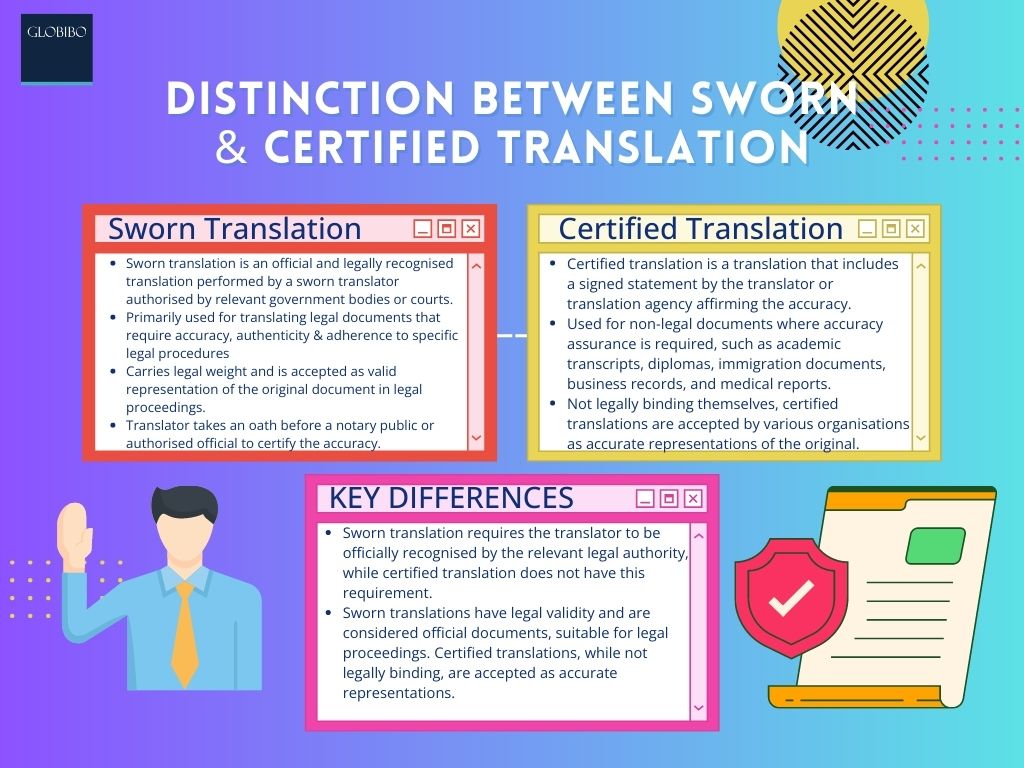Translation plays a crucial role in bridging language barriers and facilitating communication between individuals and businesses around the world. When it comes to official documents or legal matters, the accuracy and authenticity of translations are of utmost importance. In these contexts, you may come across the terms “sworn translation” and “certified translation.” While they both refer to specialized translation services, there are distinct differences between the two. In this article, we will explore the distinction between sworn and certified translation to help you understand their unique purposes and requirements.
Introduction
Sworn and certified translations are specialized services provided by professional translators who possess the necessary qualifications and expertise. These types of translations are often required for legal, governmental, or official purposes. While they share the goal of ensuring accurate translations, there are distinct differences in their scope, requirements, and the authority of the translators involved.
What is Sworn Translation?
Sworn translation, also known as official or legal translation, refers to translations that are recognized and authorized by governmental or judicial entities. Sworn translators are linguists who have been officially appointed or recognized by a relevant authority, such as a court, government agency, or consulate. Sworn translations are typically required for legal documents, contracts, certificates, and other official records that hold legal significance.
The Role of Sworn Translators
Sworn translators are entrusted with the task of providing accurate and faithful translations of official documents. Their role involves not only translating the text but also certifying the accuracy and completeness of the translation by signing and stamping the translated document. Sworn translators are bound by ethical and professional standards to ensure the integrity and confidentiality of the translated content.
Characteristics of Sworn Translation
Sworn translations bear the official stamp or seal of the sworn translator, along with their signature. The translated document is considered a legal and official equivalent of the original text. Sworn translations are typically required in legal proceedings, immigration processes, academic applications, or any situation where the translation needs to be officially recognized and accepted by authorities.
What is Certified Translation?
Certified translation, on the other hand, refers to translations that are accompanied by a signed statement, often referred to as a certificate of accuracy. Certified translators are professional linguists who have the necessary qualifications and expertise to provide accurate translations. While certified translations are widely accepted, they do not have the same official recognition as sworn translations.
The Role of Certified Translators
Certified translators play a vital role in ensuring accurate translations of various documents, including academic transcripts, birth certificates, marriage certificates, and other personal or professional documents. They provide a certificate of accuracy that attests to the quality and faithfulness of the translation. Certified translations are typically used for non-legal purposes, such as immigration applications, academic submissions, or business documentation.
Characteristics of Certified Translation
Certified translations are accompanied by a certificate of accuracy, which includes the translator’s statement affirming the accuracy and completeness of the translation. The certificate is signed by the certified translator and may include their contact information, qualifications, and membership in professional translation associations. Certified translations are widely accepted and trusted for various official and non-official purposes.
Key Differences Between Sworn and Certified Translation
The main differences between sworn and certified translations lie in their official recognition and the authority of the translators involved. Sworn translations are authorized by governmental or judicial entities and bear the official stamp or seal of the sworn translator. They hold legal significance and are required for official or legal proceedings. Certified translations, while not officially recognized in the same manner as sworn translations, are widely accepted and used for various non-legal purposes. They are accompanied by a certificate of accuracy, signed by the certified translator.
Conclusion
Sworn and certified translations are specialized services provided by professional translators for different purposes. Sworn translations are recognized and authorized by governmental or judicial entities and bear the official stamp or seal of the sworn translator. They are required for legal or official proceedings. Certified translations, on the other hand, are accompanied by a certificate of accuracy and are widely accepted for non-legal purposes. Understanding the distinction between sworn and certified translation ensures that you can choose the appropriate service based on your specific needs.
For More Details Visit: https://www.globibo.com/
Frequently Asked Questions (FAQs)
What is the difference between sworn translation and certified translation?
Sworn translation is authorized by governmental or judicial entities and bears the official stamp or seal of the sworn translator. It is required for legal or official purposes. Certified translation, while not officially recognized in the same manner as sworn translation, is accompanied by a certificate of accuracy signed by the certified translator. It is widely accepted for various non-legal purposes.
What are sworn translators?
Sworn translators are linguists who have been officially appointed or recognized by a relevant authority, such as a court, government agency, or consulate. They are entrusted with providing accurate and faithful translations of official documents and certifying the accuracy of the translation.
What are certified translators?
Certified translators are professional linguists who have the necessary qualifications and expertise to provide accurate translations. They provide a certificate of accuracy that attests to the quality and faithfulness of the translation.
When are sworn translations required?
Sworn translations are typically required for legal documents, contracts, certificates, and other official records that hold legal significance. They are needed for legal proceedings, immigration processes, academic applications, or any situation where the translation needs to be officially recognized and accepted by authorities.
When are certified translations used?
Certified translations are used for various non-legal purposes, such as immigration applications, academic submissions, business documentation, or any situation where a reliable and accurate translation is required but official recognition is not necessary.


